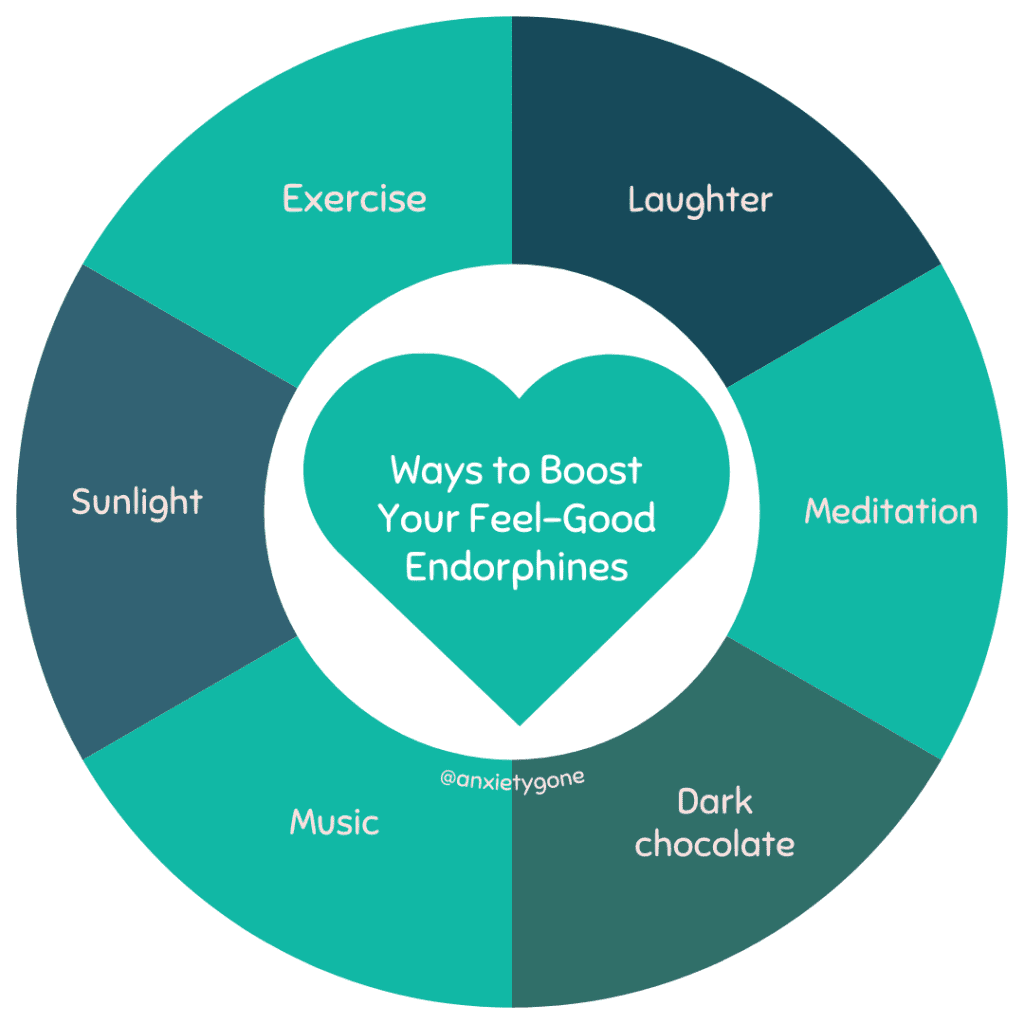Full Disclosure: Clicking on these links could mean a tiny commission for me, at no extra cost to you.
Imagine your brain has a built-in pharmacy capable of dispensing natural painkillers and mood enhancers, no prescription needed. Well, that’s the reality of how endorphins, your body’s own “feel-good” chemicals, work. Within the intricate networks in your brain, endorphins play a pivotal role in regulating mood, reducing pain, and promoting a sense of well-being. They’re responsible for the feeling of a runner’s high, the joy of laughter, and the satisfaction of a good meal. But their influence extends far beyond these specific moments of happiness. Understanding endorphins and its effects on mental health opens up new perspectives on how we can nurture our well-being naturally. So, let’s dive into the practical strategies for boosting endorphin levels for a positive effect on the mind and body.
What Are Endorphins?
Endorphins are natural chemicals produced by the body that act as neurotransmitters in the brain. They are often referred to as “feel-good” hormones because they are associated with feelings of pleasure and pain relief. Endorphins are released in response to various stimuli, including stress, pain, exercise, and even certain foods. They bind to opioid receptors in the brain, similar to the way opioid medications do, but with milder effects.
These feel-good brain hormones play a role in regulating mood, reducing pain perception, and promoting a sense of well-being. They are also known to enhance the immune system and reduce stress levels.
The Science Behind Endorphins
Endorphins are often hailed as the body’s natural painkillers, but their role in our well-being extends far beyond just pain relief. These complex brain chemicals, produced by the central nervous system and the pituitary gland, resemble opiates by producing analgesia and a sense of happiness. The term “endorphin” itself comes from “endogenous,” meaning from within the body, and “morphine,” an exogenous pain reliever, highlighting its natural pain-relieving ability.
At a molecular level, endorphins work by binding to the opioid receptors in the brain, reducing pain perception and boosting feelings of pleasure. This process is akin to how prescription painkillers work, but without the risk of addiction or overdose. It’s a fine example of the body’s innate wisdom in preserving balance and fostering recovery.
Types of Endorphins and Their Functions
There are various types of endorphins. Beta-endorphins are the most potent and have been the focus of most research.
Here are the main types and their functions:
- Beta-endorphins: These are the most potent type of endorphins and have been extensively researched. They are primarily found in the hypothalamus and pituitary gland. Beta-endorphins play a crucial role in regulating mood, reducing pain perception, and promoting feelings of pleasure and satisfaction. They are also involved in various activities such as eating, drinking, physical fitness, and love, essentially contributing to the brain’s “reward” circuits.
- Met-enkephalins: Met-enkephalins are another type of endorphins that are found throughout the body, including in the brain and spinal cord. They are involved in pain modulation and stress response, helping to alleviate discomfort and promote relaxation.
- Dynorphins: Dynorphins are primarily found in the spinal cord and brain regions involved in pain perception and emotional regulation. They play a role in modulating pain signals and may also have effects on mood and behavior.
- Endomorphins: Endomorphins are relatively newer discoveries compared to other types of endorphins. They are highly selective for certain opioid receptors in the brain and spinal cord. Endomorphins are believed to be involved in pain modulation and may have potential therapeutic applications for pain management.
Apart from their well-documented analgesic effects, endorphins play a crucial role in modulating appetite, releasing sex hormones, and enhancing the immune response as well.
Benefits of Endorphins
Here’s a quick recap of the benefits of endorphins for your mind, body and soul:
- Alleviate pain and discomfort
- Enhance pleasure
- Reduce stress, depression, and anxiety
- Decrease inflammation
- Enhance mood
- Elevate self-esteem
- Support a healthy immune system
- Improve memory and cognitive function
The Link Between Endorphins and Mental Health
The link between endorphins and mental health is significant, as endorphins play a crucial role in regulating mood and emotional well-being. Plus, these brain chemicals didn’t get their nickname of being “feel-good hormones” for no reason.
Here are some key points about this connection:
Endorphins and Stress Relief
Endorphins are released in response to stress and pain as a natural coping mechanism. They act as natural painkillers and help reduce the perception of pain, both physical and emotional. This can help you better manage stress and anxiety, promoting a more positive outlook on life.
Endorphins and Depression
Endorphins play a significant role in the battle against depression. Research has shown that people with depression often have lower levels of endorphins compared to those without. This discovery has paved the way for therapeutic approaches that aim to increase endorphin levels, such as regular exercise and laughter therapy.
Engaging in endorphin-boosting activities has been found to complement traditional treatments for depression, such as medication and therapy. While not a standalone cure, these activities can significantly enhance mood and contribute to a comprehensive mental health strategy.
Mood Regulation
Endorphins are often referred to as “feel-good” chemicals because they have the ability to induce feelings of pleasure and euphoria. When released in the brain, endorphins can improve mood and create a sense of well-being. This can help alleviate symptoms of depression, anxiety, and stress.
Endorphins and Anxiety Relief
Research suggests that endorphin levels may be lower in individuals with mood disorders such as anxiety and depression. Increasing endorphin levels through activities like exercise, socializing, and laughter can help alleviate symptoms of these conditions and improve overall mental health.
Pain Management
Endorphins act as natural painkillers in the body, binding to opioid receptors and reducing the perception of pain. Chronic pain conditions often coexist with mood disorders, and managing pain effectively with endorphin release can improve overall mental health.
Boosting Your Endorphins
Just when you thought endorphins couldn’t get any better, you discover that you can actually increase them yourself! By making a few simple changes in your diet, mindset and lifestyle, you can boost your endorphins to unleash a flood of those feel-good hormones.
4 Physical Activities That Increase Endorphins
Incorporating simple, joyful activities into our daily routines can significantly amplify our endorphin levels, promoting mental health and resilience against stress and depression. Here are some effective strategies:
1. Exercise and the “Runner’s High”
It’s well-documented that regular physical activity can stimulate the release of endorphins, leading to improved mood and energy levels. Whether it’s a brisk walk, a dance class, or a rigorous workout session, exercise can elicit the famed “runner’s high,” a state of euphoria and reduced pain perception attributed to a surge in endorphin levels.
2. Yoga and Meditation
Beyond the more intense physical exercises, yoga and meditation also play a significant role in boosting endorphins. These practices not only help in stress reduction but also enhance mood by promoting the release of endorphins. The mindful breathing and movement in yoga, along with the mental focus achieved through meditation, can lead to a peaceful and happy state of mind.
Exclusive Offer: Access Online Yoga Classes for as low as $10/month.
3. Outdoor Activities
Spending time outdoors, especially in natural settings like parks, forests, or near water bodies, can enhance the mood-boosting effects of physical activity. Activities such as hiking, trail running, and outdoor sports offer the dual benefits of exercise and exposure to nature, which can further elevate endorphin levels.
4. Team Sports
Engaging in team sports such as basketball, soccer, or volleyball not only provides a great workout but also offers social interaction and camaraderie, which can enhance the mood-boosting effects of physical activity.
5 Lifestyle Changes to Enhance Endorphin Release
Here are some lifestyle changes that can help enhance endorphin release:
1. Healthy Diet
Consume a balanced diet rich in whole foods, including fruits, vegetables, lean proteins, and healthy fats. Avoid excessive consumption of processed foods, sugar, and alcohol, as they can negatively impact mood and endorphin levels.
2. Adequate Sleep
Prioritize good sleep hygiene by maintaining a consistent sleep schedule, creating a relaxing bedtime routine, and ensuring a comfortable sleep environment. Aim for 7-9 hours of quality sleep per night to support optimal endorphin production.
3. Stress Management
Practice stress-reduction techniques such as deep breathing exercises, meditation, yoga, or mindfulness. Chronic stress can suppress endorphin release, so finding healthy ways to manage stress is crucial for enhancing mood and well-being.
4. Mindfulness Practices
Incorporate mindfulness practices into your daily routine, such as mindful breathing, body scans, or mindful walking. Mindfulness helps to increase awareness of the present moment and can enhance the effects of endorphin release during physical activity or relaxation.
Exclusive Offer: Receive access to hundreds of mindfulness activities and meditations here.
5. Socializing and Laughter
Human connection and laughter are potent stimulators of endorphin release. Spending time with loved ones, sharing laughs, and engaging in social activities can naturally boost your endorphins, improving your mood and reducing stress.
The Bigger Picture: Endorphins for Treating Mental Health
Understanding and leveraging the power of endorphins is just one aspect of a holistic approach to mental health. While boosting endorphin levels can provide significant benefits, it’s important to recognize the limitations and not view it as a cure-all. A comprehensive mental health strategy should also include other elements such as professional therapy, medication when necessary, and a supportive social environment.
Integrating endorphin-boosting activities into daily life can enhance mental well-being, but it’s essential to maintain balance and seek professional help for serious mental health issues. The goal is to create a well-rounded, healthy lifestyle that supports both physical and mental health, acknowledging that endorphins are a piece of the puzzle, not the entire picture.
FAQs
- What are endorphins, and why are they important?
Endorphins are natural chemicals in the body that have pain-relieving properties and are capable of inducing feelings of pleasure and satisfaction, playing a crucial role in managing stress and emotional well-being. - How can I naturally increase my endorphin levels?
Regular exercise, laughter, socializing, certain foods like chocolate and spicy dishes, and practices such as yoga and meditation can all contribute to increased endorphin levels. - Are there any risks associated with artificially boosting endorphins?
While natural methods of boosting endorphins are generally safe, relying on artificial means or substances to stimulate endorphin release can lead to dependency and other health issues. - Can endorphin levels impact one’s susceptibility to mental health disorders?
Low levels of endorphins have been linked to conditions such as depression and anxiety, suggesting that boosting endorphin levels can play a role in mitigating these disorders. - How do endorphins interact with other neurotransmitters in the brain?
Endorphins can influence the brain’s overall neurotransmitter balance, interacting with chemicals like serotonin and dopamine, which also play significant roles in mood regulation and mental health. - Can exercise replace medication for mental health conditions?
While exercise and increasing endorphin levels can significantly improve mood and contribute to mental well-being, they should not be seen as replacements for professional medical treatment in cases of serious mental health conditions.












